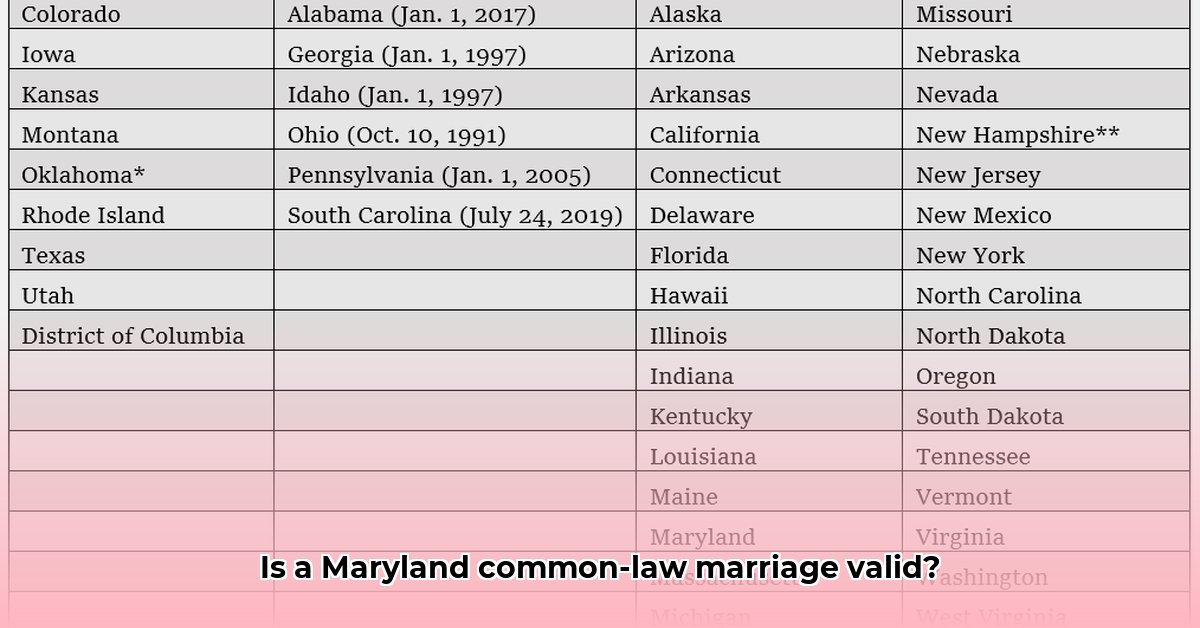
Thinking about common-law marriage in Maryland? Let's clarify the complexities. While many states recognize common-law marriages, Maryland doesn't recognize those formed within the state. If you've been living together in Maryland and considering yourselves married without a formal ceremony, you aren't legally married in Maryland's eyes. However, Maryland does recognize valid common-law marriages established in other states. This guide explains how Maryland handles these situations, the steps involved in proving a marriage formed elsewhere, and the legal implications. While we provide helpful information, remember, consulting a Maryland family law attorney is crucial for personalized legal advice and protection.
What is Common-Law Marriage?
A common-law marriage, also called an informal marriage, occurs without an official ceremony or marriage license. It's a legal agreement demonstrated through actions and public declarations, proving the commitment to being married. Many states used to, and some still do, allow this, but requirements vary. Crucially, remember that Maryland itself doesn't create such marriages.
Maryland's Stance: Recognition, Not Creation
Maryland uniquely doesn't allow the creation of common-law marriages within its borders. You can't simply declare yourselves married and have it legally recognized within Maryland. Importantly, if a valid common-law marriage occurred in another state (like Iowa or Colorado, for instance), Maryland will recognize it. This distinction is vital to understand.
Proving Your Common-Law Marriage in Maryland (If Formed Elsewhere)
Proving an out-of-state common-law marriage in Maryland requires substantial evidence. Think of it as building a compelling case. The court needs to see clear proof of your commitment to being married.
Steps to Proving Your Marriage:
Demonstrate Intent: Did you both unequivocally agree to be married? Evidence such as emails, letters, or witness testimony is important. Casual conversations require supporting evidence to demonstrate your commitment.
Establish Cohabitation: Living together is key, but duration and shared responsibilities are crucial. Months don't cut it; years of demonstrable commitment are needed.
Publicly Present as Married: Did you inform friends and family? File joint tax returns? Use the same last name? Insurance policies, bank accounts, and even social media posts can serve as evidence.
Gather Your Documentation: Compile all relevant documents: joint bank statements, tax returns, insurance policies listing each other as spouse, mortgage documents, deeds, wills, medical records, photos, letters, etc. The more, the better.
Legal Ramifications in Maryland: Understanding the Implications
Once a Maryland court recognizes your out-of-state common-law marriage, it carries significant legal weight:
- Property Division: In separation or divorce, Maryland's laws on dividing marital assets will apply.
- Inheritance: You inherit from your spouse according to Maryland's intestacy laws (rules for distributing property without a will).
- Spousal Support (Alimony): You might be eligible for alimony.
- Healthcare Decisions: You have the right to make healthcare choices for your spouse.
- Social Security Benefits: You may qualify for Social Security spousal benefits.
Seeking Legal Counsel: Protect Your Rights
Navigating common-law marriage complexities is challenging. Proving one formed in another state in Maryland is especially intricate. A skilled Maryland family law attorney is essential. They guide you, help gather evidence, and represent you in court if necessary. Don’t face this alone.
Key Takeaways:
- Maryland doesn't create common-law marriages.
- Maryland recognizes valid common-law marriages from other states.
- Proving a common-law marriage requires strong evidence.
- Legal advice is vital for navigating the intricacies of this process.